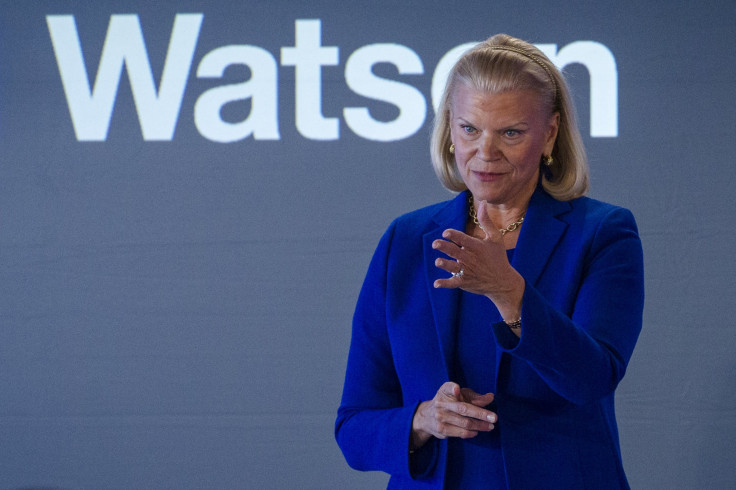Chip Divestiture Puts Struggling IBM On Faster Track To The Cloud

International Business Machines Corp.'s divestiture of its chip-making business to Globalfoundries is CEO Ginni Rometty’s latest move to transform the company from a broadly diversified tech generalist to a more narrowly focused purveyor of cloud-based data and analytics services. In doing so, Rometty is accelerating a process initiated by her predecessor, Sam Palmisano.
The transformation can’t come quick enough for Big Blue and its investors. IBM said Monday that third-quarter earnings, not including the chip unit, were down 8 percent, to $3.46 per share, while net income was off 17 percent, at $3.5 billion. “We are disappointed in our performance,” Rometty said. “We saw a marked slowdown in September in client buying behavior.”
IBM shares were down by more than 8 percent in premarket trading.
Under a long-rumored deal confirmed in the predawn hours, IBM will pay Globalfoundries $1.5 billion to take the money-losing chip unit off its hands. IBM will continue to design processors, which, going forward, will be fabricated by Santa Clara, California-based Globalfoundries. “This acquisition enables IBM to focus on fundamental semiconductor and material science research, development capabilities and expertise in high-value systems,” IBM Senior Vice President John Kelly said.
Earlier this year, Rometty sold off IBM’s commodity, or x86, server unit to China’s Lenovo Group for $2.1 billion. In 2005, Palmisano sold the company’s PC business to Lenovo for $1.75 billion. Palmisano also dispatched Big Blue’s storage and commercial printing units during his tenure from 2002 to 2012.
Rometty is continuing Palmisano’s work to position IBM as a specialist in helping businesses and public-sector organizations manage and extract value from vast streams of data incoming from the Web, mobile and social channels. It’s a model that is more about selling knowledge than hardware and one that Rometty sees as leading to more lucrative, higher-margin engagements.
The deal is also the latest sign that it is becoming increasingly difficult for U.S. companies, with their higher cost structures, to thrive against global competitors in a hardware market known for razor-thin margins. Hewlett-Packard CEO Meg Whitman earlier this month announced that the company would split into two operating units. HP Enterprise will focus on high-end commercial systems and software, while HP Inc. will sell PCs and printers. Reports indicate the latter may be up for sale, possibly to Lenovo.
While it sheds commodity hardware, IBM is investing heavily in software and services designed to help organizations make better, faster decisions. Rometty in January announced that the company would invest $1 billion in a new business unit centered around Watson. Watson is a “cognitive computing” platform that can respond to natural language queries and is seeing growing interest from companies in financial services, health care, education and other markets.
Rometty’s challenge is to grow those businesses fast enough to compensate for declining sales in IBM’s traditional strongholds in information technology staples such as servers and storage systems. IBM’s revenue from hardware fell 15 percent in the third quarter.
Globalfoundries will take over operations of IBM’s chip-making lines in East Fishkill, New York, and Essex, Vermont. The company “will provide employment opportunities for substantially all IBM employees at the two facilities,” according to a statement.
IBM took a pretax charge of $4.7 billion in the third quarter to cover costs associated with the Globalfoundries divestiture.
© Copyright IBTimes 2024. All rights reserved.





















